Interview with Travis
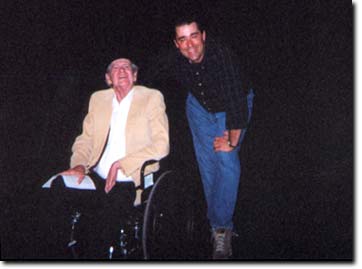 Thanks to Doug Thompson, I have at long last been able to contact the man and legend himself, Travis Edmonson! I spoke to him for about two hours by telephone on Wednesday, February 26, 1997. Even through the thousands of miles of phone line between Pittsburgh, Pennsylvania and Mesa, Arizona, Travis's energy and enthusiasm were plainly evident. As the man himself told me, "I'd like to quote Mark Twain: 'Rumors of my death have been greatly exaggerated'!" Exaggerated, indeed!
Thanks to Doug Thompson, I have at long last been able to contact the man and legend himself, Travis Edmonson! I spoke to him for about two hours by telephone on Wednesday, February 26, 1997. Even through the thousands of miles of phone line between Pittsburgh, Pennsylvania and Mesa, Arizona, Travis's energy and enthusiasm were plainly evident. As the man himself told me, "I'd like to quote Mark Twain: 'Rumors of my death have been greatly exaggerated'!" Exaggerated, indeed!
Enough of my yapping: I now give the podium (most of it, anyway!) to Travis Edmonson!
Tom Straw: It is a great honor to be talking to you.
Travis Edmonson: And I to you! I'd like to quote Mark Twain: "Rumors of my death have been greatly exaggerated!"
TS: I'm glad you have a sense of humor about that!
TE: Sure!
TS: I have a ton of questions I want to ask you. I'm not even sure where to begin . . .
TE: Fire away!
TS: How and when did you meet Bud, and what made you decide to form a duo?
TE: Bud was in the Army with my older brother, Colin. Colin brought Bud home with him once on leave way back in about 1948 or so. That was the first time I met him, but nothing came of it then. After that, I didn't see Bud for a long, long time until again in San Francisco. I had been playing the Purple Onion since leaving the Gateway Singers, and then Bud started playing there. We started playing together--day and night, really. And it really all just came together then.
Bud really loved what I was doing with the traditional Mexican songs. When I met him, he didn't know a word of Spanish, and was probably only an adequate folk guitarist. But he got good.
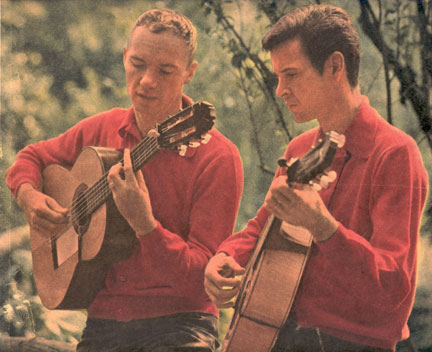
TS: Many of my sources have told me that you and Bud had a very tumultuous relationship. But how would you characterize your relationship with him?
TE: We fought nine-tenths of the time, no doubt about that. Tooth and nail. In fact, we hated each other.
TS: Really?
TE: Oh, yes. But like all feuds, like all hatreds, it was all about very stupid, very petty things. I admit that. But what can you do? You are the way you are when you're young.
TS: What did you fight about?
TE: Oh . . . (pause) . . . Who the Hell can remember? (Laughs) We fought about everything. But nothing. Like I said, silly stuff. When we first got together, I was more established, having been with the Gateway Singers. So, we were first called "Travis and Bud." But then, Bud said to me, "I can't pronounce that." That's where it all started, and it didn't get any better from there!
TS: Wow . . . I have to admit that you're destroying some naive illusions, here. I grew up always associating one with the other: where there was Bud, there was Travis. I saw your faces together on album covers. I thought: "These two must be best friends."
TE: No way. But understand something: Bud and I were together constantly, in extremely close quarters, for eight and a half straight years. From about, oh, 1958 to 1966. We never even took a break for Christmas. It was constant. It was just the worst of circumstances. I mean, the closest of lovers or married people couldn't live through that; it would break them apart.
TS: So you think that under better circumstances, you and Bud could have been friends?
TE: We could've gotten along better. But I have to say, in one way, we were the best of friends, close as anyone can be: that was on stage. We could be standing around just fuming, but when the lights went down and we got on stage, everything was hunky-dory. It was magical.
TS: What is your favorite Bud and Travis album?
TE: The Latin Album.
TS: That's my all-time favorite album!
TE: Thank you!
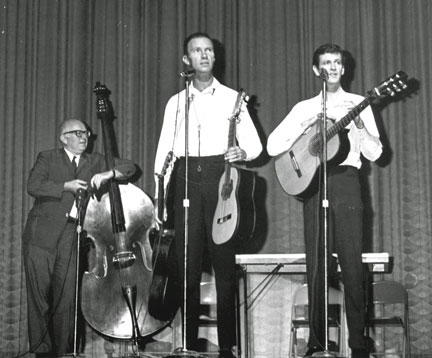
TS: Didn't David Wheat produce that?
TE: No, no! I did! And I did all our arrangements. Buck was our bass player. He passed away recently, you know. That is a great loss.
The Latin Album was my little baby. I had wanted to do a record like that for a long time. I learned how to play guitar in a mariachi band, and I grew up on the Mexican border, so I had had the Mexican influence all my life. There was a mariachi group around at that time called Trio Los Panchos. They were a great group, and they were a huge influence on The Latin Album.
TS: What is your favorite B&T song?
TE: Without a doubt, "Malaguena Salarosa."
TS: Other than that?
TE: Oh . . . there were so many good ones. All the Latin stuff. "Cielito Lindo Son Juasteco." Wait . . . there was "Golden Apples of the Sun." I wrote the music for that, you know! That's one of my favorites! In fact, I'll say that "Apples" is my English-language "Malaguena." When I played that for Judy Collins, she just flipped! She loved the music I did for that, and ended up recording it on one of her albums, I think. Then there's "Haiti." You know that after we did that, Haiti made it their national anthem!
TS: Really?
TE: Oh, yeah! Also, one of my favorite songs that I ever wrote was not a Bud and Travis song, but rather one of my solo. It's called "Song of the River." It's on the TAMMIES CD from last year.
TS: Let's talk for a minute about your between-songs comedy patter. I always suspected that you guys were a great influence on the Smothers Brothers.
TE: Oh, yes, we were! We were really the first group to do the comedy. The Smothers followed, and then a lot of other groups started doing it.
TS: Have the Smothers ever acknowledged your influence?
TE: Oh, yeah! I just went to a concert recently, and they stopped the whole damn thing right in the middle . . . shined a spotlight on me . . . embarrassed the Hell out of me!
TS: In much of your comedy patter, I hear an outright dislike on your and Bud's part for rock music, which was really just getting started then. How do you feel about rock music?
TE: I don't like rock and roll one bit. Never have. I think it's a poor imitation of an American music. It's about one-tenth the blues, and the rest is just, well . . . garbage. They have some great musicians, great players, but the music itself . . . it's very un-musical.
TS: You don't like the Beatles?
TE: I never liked the Beatles. I did meet them once, though. It was back when they were playing the Hollywood Bowl. All four of them. They were very nice guys, and very funny. I will say that. But I just don't care for their kind of music.
TS: This is very interesting, because some of the rumors I've heard have you hanging out with a lot of folk-rock stars in the mid-sixties, after you split with Bud.
TE: I never hung around with any rock stars.
TS: How about David Crosby?
TE: David worked for me. He got his start with me. You know, he said in his book that I turned him on to a joint, and that is totally untrue. That never happened.
TS: Since we're on the subject . . . I must say that I have heard some crazy stories--even outside of the Crosby book--about your lifestyle in the old days.
TE: I drank and I smoked. I know that I had the reputation of being the wild one, and Bud was supposed to be a "clean liver." I don't want to get too much into this, but Bud was no "clean liver." That's all I'll say. He has a widow and children, so I refuse to say anything else. But I was never that wild. I was actually very quiet, very shy.
TS: A lot of the people who I talk to today do say that you kept to yourself a lot; you were always sort of on the sidelines . . .
TE: Oh, yes. That's very much me. I was shy. And I was doing a lot of the damn work. That's not a good thing for a shy person to do . . . But I do keep to myself, sort of on the sidelines. I was like that during the TAMMIES, too. And today, I don't drink anymore. I sometimes smoke cigarettes.
TS: What was your favorite or most memorable gig with Bud and Travis?
TE: Once we were going out of Australia and New Zealand and had a layover in Tahiti. We were walking along, and a crowd started forming around us, and they actually started singing our songs! I turned to Bud and said, "Are we not clear on the other side of the world? What the Hell is going on?" Eventually, we got up on the tarmac, grabbed our guitars, and played for all of them for about an hour. It was marvelous. Afterward, everyone was saying--the audience, the pilots, the crew--that nobody else would do that. And that was true. Only Bud and I would do that.
TS: You know, despite what you say sometimes, I can sense a lot of affection in what you say for Bud.
TE: Parts of me love him. No doubt about that. Parts of me love him.
TS: What were the two of you fighting about at the Gate of Horn in that incident Frank Hamilton describes on the page?
TE: Who the Hell knows? (laughs) Something stupid. But I must say that Bud didn't give me a bloody nose. He pushed me into the wall, and my head was broken open. That's what happened.
TS: Well, I'm glad that's clear! It sounds like you two are lucky you didn't kill each other!
TE: We are.
TS: Well, here's a question that I--as well as many B&T page downloaders--have had ever since starting to love your music. What have you been doing since the breakup of Bud and Travis? Let's start with the late Sixties.
TE: Sure. Well, I did a record for Frank Sinatra. I found out he was a big fan of mine! What a surprise, and what an honor! I did that record for his company--what was it?--Reprise, I think. Travis On His Own. I also did the live record at the Troubadour, Travelin' With Travis. There was also Travis On Cue.
TS: What was it like doing the record for Sinatra?
TE: Well, there I was doing all this American folkie stuff, strumming away, and it turns out he wanted all the beautiful boleros! Oh, well.
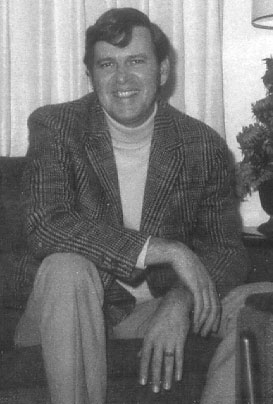
TS: What about the 70s?
TE: I played by myself at the Tucson Ramada lounge and I filled the damn thing so much that they named it after me! I also made two records of cowboy songs: The Liar's Hour with the great Billy Moore, a cowboy singer, and Ten Thousand Goddamn Cattle with Katie Lee, who is an absolute jewel of American folk music. She knows more cowboy songs than anyone, even cowboys! In the late 70s and into the early 80s, I also played the guest ranches in and around Tucson, and I always went over really well there. Then I had my accident in 1982, and I haven't been able to play since.
TS: What happened?
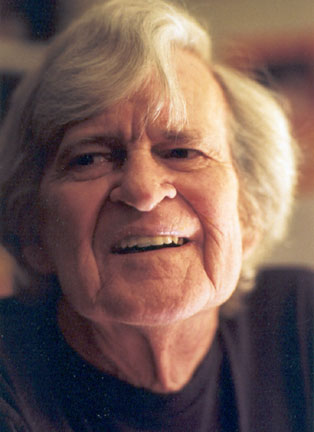
TE: I had an aneurysm. I haven't played an instrument since then because of it. I can't.
TS: That's terrible. Are you still involved with music in any way?
TE: Oh, yes! I still write for both the Kingston Trio, and I'm getting some stuff together to submit to the Smothers Brothers!
TS: Music or patter?
TE: Both! One of the members of the Trio even moved here, to my neck of the woods, so that he could be closer to me. With the Smothers, it's a little harder. We have to do it all by mail. They're based up in the Pacific Northwest.
TS: What else have you been up to lately, musically?
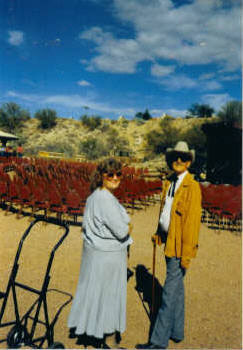
TE: I've been coaching three young singers here in the Mesa area. They're coming along real well. There's also a fine singer here named Gerry Glombecki who has just released a record called 49 and Holding. There's a song on it called "Gopher Blues" that I co-wrote with him. Then there's "Song of the River" on the TAMMIES CD.
TS: Well, before we finish and before I forget, I have a message to you from my Mother!
TE: Fire away!
TS: She says, "We love you. Thanks for all the great music and memories, and hang in there."
TE: God bless her heart! I love her! Tell her, "I did it for love"!
TS: And I must say that it was my Dad who introduced me to your music.
TE: God bless him! Tell him "Thanks"!
TS: Do you have any other messages to all your fans out there, anything at all you want to say to them?
TE: (After short pause) Well, yes: "I'm not through!"
NOTE: More info gleaned from my talk with Travis can be found in Travis's Bio link. Be sure to check it out!
Bud's Notes On Cloudy Summer Afternoon
by Bud Dashiell
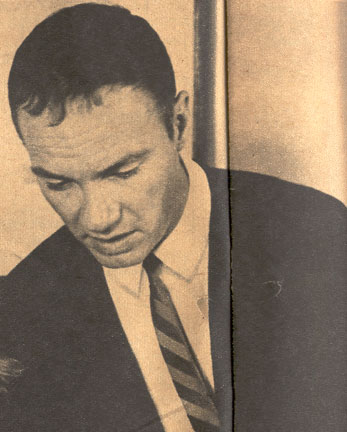
Bud and Travis got together initially because they had performed on a lot of FM radio shows done by a very knowledgeable, competent DJ by the name of Skip Weshner. Skip was aware that we knew a lot of songs together and we agreed to go and do the show. It was so easy to sing harmony and play two guitars and sing songs what we both knew. The phones kept ringing and people wanted to know where they could buy the album. Well, there wasn't any album, it was a live show.
Travis had already contemplated a career in music instead of anthropology which had been his first choice, I had not. I was going to be an illustrator attending an art center school (now in Pasadena, then in Hollywood).
It was the reaction that we got that made us make the decision to get together and try to do something in view of the fact that we both agreed on what we wanted to say. Bud and Travis, understand, never became a household word, but Bud and Travis was probably the first act to ever be extended for a month at the Blue Angel in New York. The Blue Angel didn't feature those kinds of acts until much later when the folk thing became a fad and universally accepted as an art form. Through a lot of advice about what to do and what not to do and what we should do if we wanted to be rich and so on, we stuck to our guns, never dropped the ball, continued to grow as musicians. A musical act has to do this or they will fade. Their audience will outgrow them.

We made our decision because the club engagements were always sold out to capacity, usually well in advance of an appearance. The concert halls, The Santa Monica Civic, the Laguna Bowl, the Hollywood Bowl, the Forest Hills Tennis Stadium all seat quite a few. The Tent House Theatre outside San Francisco, The Hungry I, the Troubadour, etc. etc., ad nauseum, you name the place, we played it. And sold it out. So I had reason to believe that what we were doing was effective. Even though it didn't make headlines. Bud and Travis never failed to accomplish their mission which was to entertain their audience and earn the money that we made.
When you examine the level of musical expertise necessary to play a thing like terrattle terbang, the tin maker man or some of those things, it becomes apparent that Bud and Travis were years before their time. Maybe too far before their time because occasionally we heard someone yelling in the audience "play a real folk song, play a real folk song." We weren't folk singers, although we did as much folk music as anybody else was doing at the time (folk music has never been satisfactorily defined; we're the only country in the world that makes that distinction). So, Bud and Travis were not accepted by the folk crowd, the jazz crowd, the rock crowd. We didn't do any of that because there were, Lord knows, enough other people doing that one. It wasn't really part of our statement anyway, even though at age thirteen I had been playing rhythm and blues (we called it boogie).
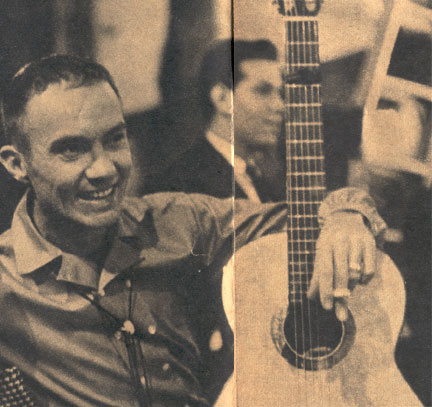
The only thing difficult about what we were doing was the fact that it was hard to get work--sometimes because people didn't want to follow us on. Their feeling being that we were funnier than they were and they didn't play guitar. Numerous comedians, when we were starting, would offer us the position of opening the show for them but we had to enter into the contract that we wouldn't talk. Talking was part of what we did, as it would be as part of a total identification. When a Bud and Travis audience walked out of a Bud and Travis concert they had one . . . been entertained, and two . . . been exposed to something they might not otherwise have ever heard, and they certainly felt they knew who we were, which could account for the word-of-mouth, underground kind of thing we created.
Since Bud and Travis stopped working together when their careers were certainly insured, and when they were positively on top of their craft, it caused a lot of people to wonder: What the hell ever happened to Bud and Travis? Why would two people ever walk out of it on top? And as usual endless rumors, all of them wrong, all of them too embarrassing even to utter. But we are a nation of sensationalists and that's just the way it is. Sensationalism will always win, will always get you space in the magazines, in the papers, in the media. You can walk in any room where people gather and say Van Gogh, and everybody will know he cut off his ear, but how many will be able to name one of his paintings or describe his style? The reason that Bud and Travis ceased was our business, no one else's.
Bud and Travis had no problem at all maintaining an audience. And I feel that the 20 albums lying around out there with our names on them, or Travis' name, or my name separately, had to be testimonial that somebody liked it. It was difficult at first to say goodbye to Bud and Travis, because it was a very carefully nurtured entity with a lot of thought, a lot of love, a lot of sweat, a lot of pain. After the cessation of Bud and Travis, Travis went back to his beloved desert where he will always live, to think, to write, to be with his wife, to sing, to make people happy, something he was always very good at. I stayed in Westwood where I teach guitar music, help young musicians acquire their knowledge, and learn their trade through a performance workshop. That's what Bud is still doing that's what Travis is still doing at last count. People had asked us why we didn't do a gig once in a while. We didn't because there was an image, a standard, to be maintained. A standard we established through a hell of a lot of really hard work and we didn't want to disappoint anybody by trying to get back together and do something feeble, in view of the fact that we didn't have seven to ten years to get to the level we were when we parted.
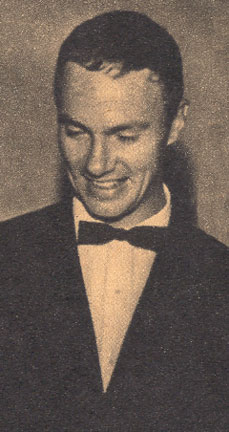
We really only geographically parted. The spirit of Bud and Travis was something that we both hung on to and still do because there was something fine about it. We're probably one of the most copied acts in the business (not probably, positively!) with the least success. There's obviously other people that felt the same way because our record company who had always backed us to the hilt decided it was time. The decision was made to release some more of what we did with a lot to choose from.
The choice wasn't easy to make but it's a fair representation, a cross section of material, although there's so many other things; obviously we couldn't get them all on one album, so we are presenting this for several reasons, these things are all live. (Ed.´s note: This is a mistake. There are some studio cuts on Cloudy Summer Afternoon.) It never took Bud and Travis longer than three 3-hour sessions to make an album. These tunes were all one time through, one time. No overdubbing, no sweetening, no anything. One time, that's it. The applause you hear is genuine. And it was left on the album, and I might add, edited substantially to make a point. Bud and Travis were loved.
There will always be those who attach folk to anything that isn't electric or doesn't make your nose bleed but that's a very innocent evaluation. We weren't folk singers--I'd be hard pressed to say that we were. Just musicians, artists with a purpose, an idea. There was us, extensions of ourselves, Bud and Travis. The reason the patter or the talk or the gags or whatever you want to call it between songs was not included is because live albums, we felt, tend to get a little tiresome once you know all the gags. It was the music we were selling primarily. Ourselves and our effectiveness as an act was what the patter was all about and that worked too.
There is an album called Bud and Travis live. (Ed.´s note: The album to which Bud is referring is actually called Bud and Travis In Person At The Cellar Door.) It was made in a nightclub in a major city in this country, on which you can see what the whole thing was about. (Ed.´s note: B&T´s comedy can also be found on the records In Concert and In Concert, Volume 2.) And incidentally the songs were selected from varying stages of our development, which is why some songs sound musically very immature, and some sound much more mature musically. Directionally more positive and some others sound very mature, very polished. You can hear the growth. I leave it to you to determine which one those were. But here is some more Bud and Travis.
P.S. People always marveled at the fact that Bud and Travis never had to look at each other when they sang. A lot of strange chemical things happened, like looking to opposite corners of the room and coming in together exactly on time. I think we used to sneeze together. Bud and Travis were born on the same day in the same year the same month, about the same time. Two years ago I had a seizure which was traced back to a brain tumor which has been corrected and cost me the use of my right hand which I have regained 80% use of. Three weeks to a month later Travis had about the same thing. It affected my right side, it affected Travis' left side. By way of identification on the record, Travis is the one with the clear rich choirboy voice, the other one, the one that sounds like an egg frying is me. Travis has black hair and black eyes, I have blond hair and blue eyes. Almost negatives of each other. I am still teaching in Westwood, Travis is still recovering in Tucson. And he will recover, make no mistake about that. And at that time maybe there'll be still more Bud and Travis. A Bud and Travis which is older, wiser, mellower and finally grown up.
Bud's Notes To I Think It's Gonna Rain Today
Liner Notes to the Album I Think It's Gonna Rain Today
by Bud Dashiell
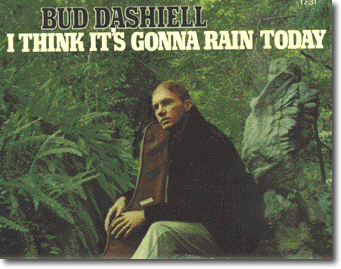
I started singing in Country music. Not folk, but COUNTRY. That only lasted until I got to the city, and in New York I met a bunch of nuts that played guitars around the village and thought I was the wildest thing since Max Bodenheim. We hung out in coffee houses that were created by the same interior decorator who did the Black Hole of Calcutta, and they interested me in folk music (not politics). As a result, I met Leadbelly, Josh White, Woody Guthrie, the McGee brothers, Sonny Terry, and all that gang. But I don't think I have even been a 'folk singer.' (By the standards set by whoever set them, I wonder if anyone has ever been one.)
Songs that involve me, that express my personal point-of-view are the ones I've always liked best. It was easier then. As one matures, it all becomes more complex. You have more to say about life when you've lived some of it. I find myself a part of a middle generation that doesn't really have a spokesperson. 'Ban The Bomb.' Sure, I am aware of the threat of war and of all our social complications and of all the establishment shortcomings. Do I have to make a career of it?
Who is speaking for the people who don't get glassy-eyed and snap their fingers and say 'yeeaahhh, baby' when one of the paisley crowd drops some obscure verbal hallucination? There are a large number of people who don't choke up over the messages offered by the Vegas-Catsskills-Miami Beach school of entertainment, either. So many noise-makers have been telling the American people to 'listen' that the American people really have started to listen, and now the noise-makers have nothing to tell them. There are a lot of non-compartmentalized people who like to listen, and I like to talk to them.
Right now, I'm an itinerant, a journeyman, a communicator, who wants to do things not because they are in vogue (I've been there) but because I am ready to talk of what I think, where I'm at, and how I feel a closeness to ideas like love, children, and my life.
Travis' Notes and Poem for Liar's Hour
The Liar's Hour liner notes show a much different personae than the average B&T fan expects from Travis Edmonson: here, we have less of a romantic Latin balladeer and more of a rough-edged Western fireside troubador. However, given Travis' Arizona background, it may be that the "mostly Latin" focus of B&T was more of a "departure" for Travis than the old West yarns (with smaller splashes of Spanish/Latin material) heard on The Liar's Hour and on his later cowboy record with Katy Lee, Ten Thousand God Damn Cattle. By this time, it appears Travis wished to introduce his audience to a broader panaroma of American southwest music, including not just Spanish/Latin and cowboy folk songs but traditional native American forms and even the more localized popular music of the day as well. Necessarily, such a deep exploration of specialized musical forms brought with it an even more specialized audience.
Nevertheless, don't go thinking Travis or his music was at this time anything more than a spiritual hop, skip, and jump away from his commercial heydey with Bud and Travis. As stereotypically "different" as the Cowboy is from the Indian, or the Latin American from the typical "anglo" American folk singer, the world they inhabit together in the American southwest is the same place. The same sense of mystery and romance and adventure dances at the center of all their varied and usually blended musical forms. Even the narration on the record (supplied by modern cowboy-legend Bill Monroe)--with its charming mix of whimsy and human insight--carries distinct echoes of B&T's live comedy patter. --Ed.
Liner Notes and Poem for the Album Liar's Hour
by Travis Edmonson
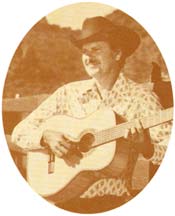
I have loved the deserts and mountains of the West since before I could tuck in my shirt-tail, and having lived in Arizona almost all my life and coming from a pioneer Arizona family, I have naturally loved the poems and songs inspired by the strange raw beauty of "My" west and its effect on the lives of cattle and horse people. All my life I've been singing and playing guitar, telling the old tales and inventing some fanciful new ones all over the world, as part of the legendary Gateway Singers, with the highly successful folk duo of Bud and Travis, and by myself.
I considered myself really lucky when, several years ago, Bill (Monroe, who appears as the narrator on the album with Travis--Ed.) and I met on a ranch outside of Tucson and I sort of plinked along while he spun some of the wild and wonderful "windies" that are preserved here. We've been meaning to cut a record for a long time, but days are long and nights are cool and time goes slow in the desert, so we just recently got around to it. For those of you who love the West, we hope this will help kindle the memory of wide-flung valleys, blue mountains, mesquite-smoke, firm handshakes, good horses, tough ranges, and cowboys who loved it all "before we was pups."
So sit back on your bedroll,
I'll tune up my guitar
And we'll weave a spell of the West That Was
Before the morning star . . .
". . . For the West wind was a true wind
And the western land was clean.
And it raised a special kind of folks
Who were seldom small or mean.
From the blue Canadian Rockies
To Sonora's silent sand
There's beauty enough for the frail and the tough
And a challenge for every man.
Some faced it hard and flinty
Some grinned and just went on
For the gold that gilded the sunset
And the silver that streaks the dawn
Myself, I'd take a story, or a poem when day was through
And we hunkered by the chuck box
With the other buckaroos.
When the campfire was a comfort
And the coyote sang his song
From the talk you'd thought that Hell itself
Couldn't stop us boys for long . . .
Now I miss the clink of the spur-shod boot
And the cowboy talk so free;
They're parts of the past.
Old Pard, we're the last
Of the West that used to be . . . "
Travis Edmonson